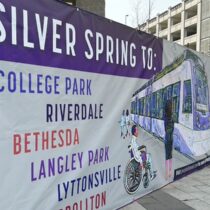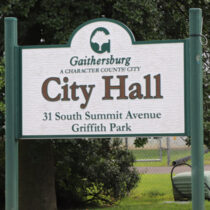
Maryland Senators Chris Van Hollen and Angela Alsobrooks criticized the Republican Party’s proposed “Big Beautiful Bill” and how it will limit access to Medicaid. In a press conference on Tuesday, June 24, the Senators shared how the legislation will negatively impact Maryland residents.
According to Van Hollen, Medicaid and the Children’s Health Insurance Program (CHIP) cover health insurance for 25% of the Maryland population. That includes 40% of births, one in three people with disabilities and five out of eight nursing home residents.
If the “Big Beautiful Bill” passes, it will cut 800 million dollars from Medicaid and 300 million dollars from the Affordable Health Care Act. According to the senators, the legislation will result in the loss of health coverage for 229,000 Marylanders. Additionally, 129,000 residents will lose SNAP benefits, which provide those in need with federal food assistance.
Senators Address Cuts to Medicaid
“Medicaid helps families stay healthy, and it helps families stay out of poverty, and the bottom line is it saves lives,” said Van Hollen. “That’s why it’s so dangerous for Republicans to be rushing through over a trillion dollar cut in healthcare.”
“When we talk about numbers, it is so important that we never lose sight of the fact that we are talking about humans. Much of what we have seen from this administration, I think, can be best characterized as inhumane,” said Alsobrooks. “When we talk about the 16 million Americans who stand to lose health insurance, and the 20 million Americans who will see their health costs rise…these are humans we are talking about.”
At the conference, the Senators invited guest speakers to testify how the loss of Medicaid will impact state residents.
Rural Residents Will Lose Benefits
Jonathan Dayton, President and CEO of the Maryland Rural Health Association, shared how cuts to Medicaid will disproportionately impact rural residents who already face barriers to healthcare, including longer distances to medical facilities and a shortage of providers.
“Without sufficient Medicaid funding, rural hospitals and clinics would face closures,” said Dayton. “At the heart of it, rural Maryland families will suffer delayed care, forgone treatments and healthcare inequities will even widen. “
Impact on the Disabled
Opal Foster, member of Maryland Down Syndrome Advocacy Coalition and President of Parents of Children with Down Syndrome in Prince George’s County, also joined the meeting to share her story and highlight the importance of accessible healthcare.
In the past year, her son, who lives with Down syndrome, needed multiple surgeries to repair his hearing. At around this same time, Foster herself went through breast cancer treatment.
“There are families that are struggling to keep their loved ones alive, and they need Medicaid,” said Foster. “It’s just that simple, unwell children and unwell families cannot thrive.”
Proposed Solutions
Van Hollen is currently working on the “Easy Enrollment in Health Care Act,” a part of the package of bills put forth by senate Democrats in response to the proposed cuts to healthcare from the Republican Party. The Senator modeled the bill after the Maryland law that allows residents to enroll for healthcare on their tax return forms.
Also in this package was a bill from Alsobrooks requiring Medicaid to cover dental, vision and hearing care.
“My colleague and partner Alsobrooks has been at the forefront of this effort,” said Van Hollen. “We’ve been working very closely together, both to raise the alarm but also to do everything we can to stop the bill.”
President Trump and Republican lawmakers aim to sign the bill into law before July 4, according to CNBC.


Comments are closed.